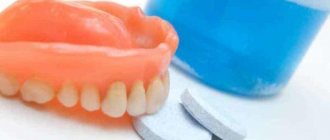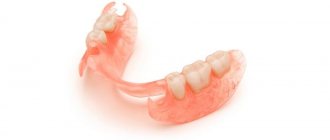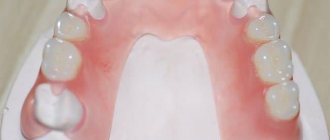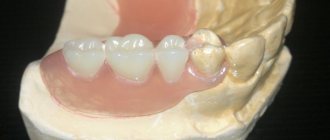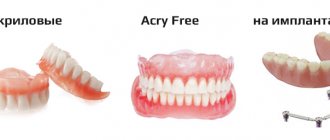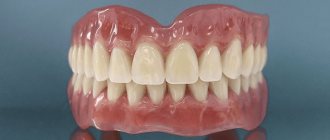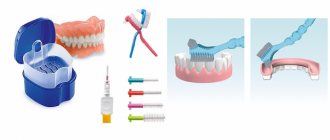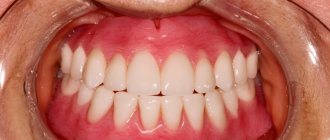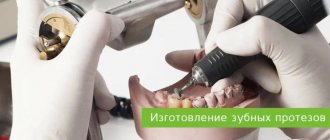06.09.2017
To fill the missing crowns of the dentition, dentists, along with implants, widely use various types of prosthetic structures that ensure the full functioning of the dentition and perfectly hide various defects. Among the many varieties of prosthetic structures, removable dentures made of nylon have recently become very popular. They are completely harmless to health, do not contain toxins and are quite comfortable to wear. These products are made using a base of nylon, a highly durable and flexible artificial polymer material. Previously, prostheses made from this material were used only as a temporary measure.
The main material for their manufacture is dental soft nylon, the structure and appearance of which are very similar to the appearance of natural teeth and gums. For this reason, the aesthetic qualities of this type of dental prosthetic structures are very high.
Flexible nylon dentures have fundamental differences from prosthetic structures made of hard plastic or metal. The hard base of plastic and metal dentures constantly rubs the gums, creating great inconvenience when talking and chewing food. Modern prosthetic structures are much softer, so they do not cause such discomfort. In addition, they have a small mass, and therefore are easily fixed in the oral cavity. In addition, some people who have completely lost teeth on one or both jaws suffer from metal allergies.
And although nylon prosthetic dental structures also have their drawbacks, which will be discussed below, the constant development of prosthetic technology leads to the appearance of new, more improved models on the market.
What are nylon dentures
The prosthetics in question is an orthodontic solution that replaces lost natural teeth in situations where it is not possible to use bridges and implants.
To create prostheses of this type, synthetic elastic polymers - nylons - are used. Using them, they create flexible, elastic, removable systems designed to replace lost teeth. The color of the material is chosen exactly to match the color of the gums.
Elasticity reduces the adaptation period, making further wearing comfortable. It usually takes about 7 days to get used to it. The structure consists of a base, directly created artificial teeth and fixing parts. The base is made of nylon. The properties of the material eliminate irritation of the mucous membrane, friction and pressure on the jaw.
Pink translucent dental nylon skillfully imitates the natural color and structure of gum tissue. The prosthesis looks quite natural. For artificial teeth, plastics of a higher quality level are most often used. Which outwardly differ little from natural ones, they imitate not only this form from nature, but also the color. Fixation elements - clasps are made of dental nylon. Therefore, even with emotional communication, the fasteners remain invisible.
Thanks to the special qualities of nylon, it is possible to obtain a fully functional prosthesis, endowed with an attractive appearance and significant resistance to mechanical damage. The product retains color when interacting with pigmenting products. However, what is most appreciated in products of this kind is the absence of irritants in the composition, which completely eliminates the occurrence of various allergic reactions during wearing.
What are the advantages of installing nylon prostheses and what are their disadvantages?
Let's start with the advantages:
- High aesthetics of prosthetics. Nylon is a translucent material, and the body of the prosthesis is also translucent. Lying on the jaw, it “merges” with it in color, so it is almost impossible to notice, even if it is installed on the front teeth. The teeth look beautiful and natural. Over time, the color of the prosthesis does not change.
- Nylon is a lightweight material, which means the prosthesis is almost weightless (several times lighter than acrylic).
- When a person chews food, the denture distributes pressure throughout the jaw.
- Since the nylon prosthesis does not contain metal elements, monomers, or polymers, it is suitable for installation even for those who are allergic to the above components.
- If the patient suffered from periodontal disease or periodontitis, but the disease was brought into remission, it is possible to install nylon dentures.
- Nylon prostheses are very comfortable for athletes.
- If there are indications, nylon structures can be installed even for children.
- Nylon is non-toxic and cannot absorb liquids or odors. Also, it itself does not emit odors or harmful substances, even when heated.
Among the disadvantages, the following points should be highlighted:
- If the rules for caring for the prosthesis are violated, various mechanical damage may appear on it.
- If the structure deforms, it will need to be completely changed.
- Dentures are worn on average for about 4–5 years, after which they have to be replaced.
Kinds
Among the variety of prostheses, they are divided into:
- partially removable;
- completely removable structures;
- conditionally removable.
Fully removable systems are most often used for complete tooth loss. They are created from individual casts, taking into account all the anatomical features and structure of the patient’s jaw.
They are made to be as comfortable as possible and the recommendation is not to take them off at all for the first time. During the test period of wear, the body gets used to it, and the doctor monitors the patient’s reaction to the prosthetics.
If necessary, the dentist makes adjustments and adjusts the design of the prosthesis, which makes wearing them more comfortable and painless. This type of removable denture looks very natural. They are made from the following materials: nylon, plastic. Please note that the structures are non-toxic and do not cause harm to health.
Conditionally removable dentures are recommended for the loss of one tooth. Such medical systems do not need to be removed before going to bed. They are attached to adjacent teeth using special cement; metal hooks and glue are also used for fastening.
Partially removable types of structures are not the most convenient. They attach to the gums and take up a lot of space in the mouth. This option is suitable for permanent wear, on a temporary basis and can replace one or more teeth. The technology is not perfect, but its financial accessibility makes it popular today.
Features of partial prosthetics
Several missing teeth in one row can be successfully replaced with a nylon denture. In this case, the teeth to which the prosthesis will cling do not need to be ground. There is no need to cover the supporting teeth with crowns. All this indicates the low labor intensity of the procedure, which allows us to set affordable prices for this type of prosthetics. The dentures are secured with clasps - special hooks also made of nylon. They gently grip existing teeth and are securely fixed.
In practice, orthodontists use 2 types of partial nylon dentures:
- A prosthesis that restores part of the dentition. It is installed on both the upper and lower jaws. Can be installed on the front or side.
- Micro prosthesis “butterfly”, restoring 1 or 2 teeth. More often, this type of prosthetics is used as a temporary option, that is, a person walks with it until an implant, crown, or bridge is installed.
Pros and cons of nylon prostheses
Medical nylon dentures are lightweight and comfortable designs that are used both for complete and partial loss of teeth. They are strong, relatively durable, aesthetically pleasing - almost invisible to others, and make it possible to completely restore chewing function. Such prosthetics can be used if the budget is limited or implantation is not possible for medical reasons.
But it has a number of disadvantages:
- not a particularly reliable fastening, even the highest quality system “looses” over time;
- requires regular hygiene - cleaning;
- systems are significant in size;
- The term of use of a removable denture is up to 5 years.
Features of caring for removable dentures made of various materials
The rules for caring for removable dentures are the same for all types of removable dentures: acrylic plastic, Acre-Free material, clasp and nylon dentures.
Some additional care requirements apply only to nylon dentures.
Nylon removable dentures are more demanding on hygiene. It must be cleaned with special care. A prerequisite for caring for nylon removable dentures is the use of soluble tablets for cleaning removable dentures.
Who is it suitable for?
Nylon denture systems can be installed to either recreate missing teeth or cover existing but unsightly ones. The use of prostheses is indicated in the following cases:
Products are installed if one or part of the teeth in the jaw is lost; they are installed in cases of complete edentia - the absolute absence of teeth. They are used when, for financial reasons, it is impossible for a patient to have implantation and installation of clasp types of prostheses.
Indicated when implants are prohibited from being implanted into a patient due to the presence of various diseases. Although nylon prostheses can be used even with existing diabetes, disorders of the cardiovascular system, even epilepsy and other diseases.
Nylon structures are often recommended for installation by children. They are used in situations where a baby tooth has been removed and a permanent replacement does not appear for a long time. In this case, prosthetics prevent the displacement of a number of teeth in the jaw and subsequent deformation of the bite.
Used in the presence of pathology such as periodontal disease. This untreated disease can lead to the loss of all teeth. Wearing a prosthesis is indicated only in the first and second stages of the disease.
Used for temporary prosthetics during the period of tissue adaptation during implantation.
Dentists sometimes recommend wearing them for people involved in dangerous work, a high risk of various injuries, including damage and loss of teeth: athletes, employees of the military and law enforcement agencies, and others.
Prosthetics with complete edentia
Often dentists are faced with the fact that patients ask for flexible nylon dentures, despite the fact that they are missing all their teeth. It would be wrong to talk about the impossibility of manufacturing such structures. In theory and in practice, this is possible, but the patient himself must be prepared for the fact that the production of this system will take a long period of time, and such a system will be more expensive financially. In addition, there are other nuances in the operation of flexible prostheses that also need to be taken into account.
- The softness of the material is a good quality for a prosthesis, but not for complete prosthetics. Discomfort from soft systems will begin to appear when eating food. If structures made of hard materials take half the load onto their base, then with nylon dentures this load is completely redirected to the gums. As a result, wounds form on the soft tissues of the gums, which first begin to hurt and then bleed.
- Flexible nylon systems are attached to the supporting teeth. In cases where all teeth are missing, the system has to be fixed with adhesives, and this brings the patient a constant feeling of discomfort. Few consumers are able to overcome the constant feeling that the jaw may fall out with any movement.
- Constant loads on the jaw lead to its subsidence. Every year it decreases by about 1 mm. As a result, after 2 years the structure becomes unsuitable for use and has to be replaced. Manufacturing a new system again costs money and time.
Considering the above disadvantages, experts recommend prosthetics for complete edentia with structures that are characterized by greater rigidity of the material used.
Contraindications
Nylon prostheses have a small number of contraindications, but in some cases specialists prohibit their installation. This includes the following cases:
Periodontal disease is prolonged, complicated and of high degrees 3rd and 4th. With this disease, the tissues surrounding the tooth are completely destroyed, the dentition is significantly displaced, and purulent ulcers appear on the gums of both jaws. Such a patient is at risk of edentia - complete loss of teeth.
The teeth on which dentures will need to be fixed are small and have a low crown. This situation significantly complicates prosthetics, since it is difficult to install the structure on them - the attachment area is small.
An inflammatory process involving the oral mucosa, as well as developed inflammation of the gums of one or both jaws. The chronic course of the disease causes tissue atrophy, and it can be very difficult to fix the prosthesis.
High gum mobility in the patient also causes difficulties with the installation of the prosthesis.
Large-scale atrophy of the jaw bone tissue.
Recession is the receding or overgrowth of gum tissue.
The process of prosthetics with nylon structures
The prosthetic procedure is carried out in stages:
- The doctor examines the patient’s oral cavity to understand which teeth are missing, determine the characteristics of the bite, identify the presence of any diseases, etc.
- If during the examination inflammation, a large amount of plaque (soft or already hardened deposits), caries and other problems were discovered, they must be eliminated before installing the prosthesis.
- Taking into account the identified characteristics of the patient’s oral cavity, the optimal orthopedic design is selected. Next, impressions are taken of the jaws.
- Before making the prosthesis, a wax template is made. It is tried on the patient, adjusted if necessary, the color and shape of the artificial teeth are selected, and then, after agreeing on all the nuances, it is sent to the dental laboratory.
- After making the structure, the doctor tries on and fixes it in the mouth, after which he tells the patient how to use and care for the prosthesis.
Cost: what it depends on
The price of nylon removable denture systems varies depending on the specific model. With complete edentia, the cost of the structure is 30-50 thousand rubles, when correcting partial edentia, the costs will be in the range of 15-40 thousand rubles, a fixed nylon prosthesis for 1-2 teeth will cost 12-15 thousand rubles.
The exact cost of a removable nylon denture can be found out at a consultation with an orthopedic dentist, who, after a diagnostic examination of the oral cavity, will indicate the exact amount required for prosthetics.
Prosthetics at 32 Dent
The 32 Dent clinic offers high-quality nylon dentures at the lowest prices in Moscow, with competent installation and fast, high-precision manufacturing. A high level of prosthetics at an affordable cost, modern equipment and the most reliable safe materials – these are the main advantages of treatment at the 32 Dent clinic. According to patient reviews, the price for flexible nylon prostheses in the clinic is very reasonable, and the designs themselves are impeccable in aesthetic and functional terms.
Nylon or acrylic: which is better?
Nylon prostheses are called “flexible” due to their elasticity. They are more convenient, and also less noticeable, than their predecessor counterparts - removable structures made of acrylic. The products are more aesthetically pleasing, but have a higher cost. A small list of contraindications for prosthetics. They do not cause allergic reactions. These elastic designs are created with a soft nylon base that is almost invisible in the mouth. The products are very comfortable to wear.
Undeniable advantages
nylon products:
- hypoallergenic - can be used for allergies;
- ease of care of the medical system;
- durability - have a long service life;
- durable and elastic, easy to use - able to withstand significant mechanical loads;
- have reliable fastening;
- do not require grinding of adjacent teeth or other painful procedures during installation;
- gel agents are not required for their fixation;
- can be worn constantly;
- does not accumulate foreign odors;
- microbiological inertness - the development of various pathogenic bacteria on the surface of the prosthesis is not supported;
- are easy to polish, so they fit tightly to the gums;
- diction is not violated;
- can be used by people suffering from heart disease and diabetes;
- It is possible to select any crown material for the manufacture of the product - the technology is available to people with different incomes.
There are also disadvantages
: fragility and softness of the manufacturing material - does not always withstand the load created during chewing. Over time, the structure “sags,” which can lead to gum injury. When wearing such structures, you should definitely monitor your oral cavity and visit the dentist with the frequency recommended when purchasing dentures.
Acrylic dentures have become widespread and inevitably enjoy considerable popularity. They are noticeably inferior in aesthetic characteristics to conventional ceramics or options made from metal ceramics. The weight of the structure is light, it does not require special care, and most importantly, it is inexpensive.
In a significant number of cases, older people are given acrylic dentures, which have an optimal quality-to-price ratio. They can be placed with partial or even complete edentia. And they are also recommended in cases where the patient has a significant gap in a row of teeth.
Advantages of acrylic products:
- almost absolute absence of contraindications;
- the product is suitable for both temporary and permanent wear;
- pleasant and easy to use
- has many shades, and therefore the color of artificial teeth will not differ from real ones;
- fastening using hooks allows you to avoid grinding down adjacent teeth;
- suitable for people of different age groups;
- have a reasonable price.
There are also disadvantages: the difference between an acrylic prosthesis and a nylon one is that it emits acrylic methacrylate, which can be negatively tolerated by the body; In the process of wearing dentures, the teeth adjacent to them are subject to abrasion, and the development of caries can result from this. They are quite fragile, despite this they can be used for about 8 years. It will take some time to get used to them.
Main advantages
According to reviews from patients and dentists, flexible nylon dentures have the following advantages:
- Resistant to fairly high functional loads and high strength. Compared to acrylic removable structures, nylon is clearly the leader.
- Hypoallergenic, completely biocompatible with the tissues of the human body.
- Preservation of the original parameters (color, shape, overall appearance, strength characteristics) throughout the entire service life.
- Durability, lightness and small thickness, ensuring comfortable wearing and aesthetic appearance.
- Reliable fixation in the oral cavity, no metal elements.
- There is no need to prepare the supporting teeth.
- Good distribution of functional loads.
- Aesthetics. Nylon successfully imitates the color and texture of the natural soft tissues of the oral cavity. You can see in the photo what a nylon dental prosthesis will look like.
- There are no contraindications - it is possible to install such structures in any clinical situations, including those when other types of prosthetics are contraindicated.
- There is no irritation of the mucous membrane or injury to the gums.
- The risk of deformation and breakage is minimized when worn properly and hygienically.
- The long service life of nylon dentures is on average about 5-7 years.
- Quick production of nylon prostheses with easy installation.
Another positive point is that flexible nylon dentures have a fairly low cost and are therefore available to almost all patients.
Care and storage of nylon prostheses
The products can be worn around the clock. They only need to be removed for hygiene purposes - cleaning. After eating, you should rinse with plain running water every time. At least 2 times a day, preferably at the beginning and end of the day, you should thoroughly clean off food debris using a special brush. Experts do not recommend using aggressive means.
They can be cleaned using regular soap and a brush. The service life of the medical system will be extended by using special baths and pastes for these purposes several times a week, and using antiseptic liquids purchased for these purposes at the pharmacy. Periodically, once every 2-3 months, it is advisable to bring nylon dentures to the clinic for more thorough cleaning.
However, despite the exhaustive information, only an experienced dentist can answer the question of which dental prosthetic option is best for you. A professional will competently assess the condition of the oral cavity, will certainly listen to your wishes and offer the best prosthetic option suitable for you.
Back
Disinfection of the prosthesis
From time to time, dentures should be disinfected, which will clean the surface of harmful bacteria. You can do this in two ways:
- Using disinfectants - special effervescent tablets that are pre-dissolved in water. Such preparations contain substances that help dissolve dental plaque, destroy bacteria and additionally whiten structures. When using tablets, just put the prosthesis in the prepared solution and wait 3 minutes. If necessary, at the end of the procedure, you can use a toothbrush and remove any remaining plaque manually.
- In an ultrasonic bath, the device helps remove bacterial plaque, get rid of unpleasant odors and destroy up to 100% of pathogens. The bath is more expensive than disinfectants, but you can buy it once and no longer spend money on purchasing chemicals.
